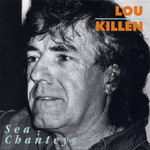> Louis Killen > Records > Sea Chanteys
Sea Chanteys
 |
Sea Chanteys ESP-Disk ESP 1085 (LP, USA, 1973) |
 |
Recorded at the Dick Charles Studio in New York City, 22 May 1968;
Produced by Pat Sky;
Album design by Dennis Pohl
Musicians
Louis Killen: vocals, concertina
Tracks
Side 1
- Row Bullies Row (Roud 928) (2.42)
- Good Ale (Roud 203; G/D 3:590) (2.05)
- Pleasant and Delightful (Roud 660; Laws O30; TYG 51) (3.09)
- Lord Franklin (Roud 487; Laws K9; G/D 1:16; Henry H815) (2.39)
- The Sheffield Apprentice (Roud 399; Laws O39; G/D 5:998; Henry H31; TYG 71) (4.27)
- Shoals of Herring (Roud 13642) (3.35)
Side 2
- Bold Jack Donahue (Roud 611; Laws L22) (2.48)
- Bold Jack Donahue Story (2.27)
- The Week Before Easter (Roud 154; G/D 6:1198) (2.36)
- The Blacksmith (Roud 816) (2.42)
- The Blind Cow Caught Fire (Roud 5323) (2.35)
All tracks trad. except
Track 6 Ewan MacColl
Review
The only album on which British folksinger/historian Louis Killen is credited as “Lou”, 1968’s Sea Chanteys is also his sole recording for the eclectic underground label ESP-Disk. Recorded in a one-day session on 22 May 1968, during the brief period Killen lived in New York City, Sea Chanteys is the first of many collections of sea and sailing songs he would record over the next several decades. All traditional songs except for Shoals of Herring, an original by Killen’s early mentor Ewan MacColl, these songs are performed completely solo and a cappella in the traditional style. Although Killen is a noted folk music scholar, there’s nothing academic about these performances, which are performed with lusty vitality and, at times, antic humor. The closing The Blind Cow Caught Fire is one of the funniest songs in Killen’s repertoire, a shaggy-dog tale of sailors taking refuge in the basement of a pub that’s burning to the ground so that they can drink the place dry before it’s destroyed. The song, like much of the rest of the album, dispels the common myth that traditional British folk music is a wan and humorless music performed by people who take themselves far too seriously. Sea Chanteys proves that nothing could be further from the truth.
Stewart Mason, All Music Guide

